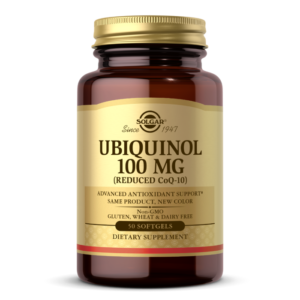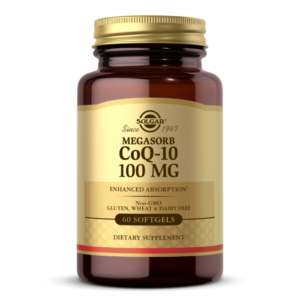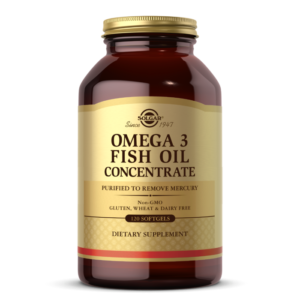Key Takeaways:
- Exercising for at least 30 minutes a day, eating heart-healthy foods, and managing stress are all important ways to support heart health
- Supplements such as CoQ-10, Ubiquinol, or Omega-3s can help fill nutritional gaps and offer added cardiovascular support
The heart is, quite literally, a pump that delivers life to the rest of the body. It is at the center of the circulatory system, a network of blood vessels that deliver blood and oxygen throughout the entire body. But poor eating habits and lifestyle choices can greatly affect the health of your heart and cardiovascular system.
Let’s look at how the heart works, how heart failure happens, and four easy ways to improve your heart health.
How does the heart work?
The heart is divided into two pumping systems, the right and left side, with two chambers that pump blood on each side. The right side of the heart receives oxygen-poor blood from your veins and pumps it to the lungs, where it picks up oxygen and gets rid of carbon dioxide. The left side of the heart receives oxygen-rich blood from the lungs and pumps it through the arteries to the rest of your body.1
How does heart failure happen?
Heart failure is a term used to describe a heart that cannot keep up with its workload. As a result, oxygen may not reach everywhere that it is needed in the body, causing systems to shut down. Heart failure can affect the right or left side of the heart, or both at the same time. It can be acute (short-term) or chronic (ongoing).
Everyone loses some blood-pumping ability in our hearts as we age, but heart failure results from the added stress of heart conditions that directly damage the heart or simply cause it to work too hard.
Four ways to live a heart-healthy lifestyle
1. Exercise regularly
Regular exercise is one of the best ways to promote heart health. Exercise can reduce “bad” cholesterol levels in the blood (the low-density lipoprotein [LDL] level), as well as total cholesterol, and can raise the “good” cholesterol (the high-density lipoprotein level [HDL]).2
That’s not all: exercise also promotes healthy physiological changes, such as encouraging the heart’s arteries to dilate more readily. It can also help your sympathetic nervous system (which controls heart rate and blood pressure) to be less reactive.3
Check with your doctor before starting any new exercise program to ensure it is the right fit for you.
What kind of exercise is best for heart health?
Exercise of any kind – resistance training (strength work), stretching and balance, aerobic exercise – will offer tremendous health benefits. In particular, aerobic exercise improves circulation, which results in lowered blood pressure and heart rate. Examples of aerobic exercise include walking, running, swimming, cycling, playing tennis, and more.4
How much exercise do I need to improve my heart health?
For adults, the American Heart Association recommends at least 150 minutes per week of moderate-intensity aerobic activity or 75 minutes per week of vigorous aerobic exercise, or a combination of both preferably spread throughout the week. Moderate-intensity aerobic activities include brisk walking, water aerobics, dancing, gardening, or biking slower than 10 mph.5
Remember: a little movement means a lot. If you struggle to exercise enough each week, something is always better than nothing.
2. Eat heart-healthy foods
Equally as important as regular exercise is eating heart-healthy foods. A nutrient-rich diet is one that includes a variety of fruits and vegetables, whole grains, skinless poultry and fish, nuts and legumes, and oils such as olive, canola, flaxseed, or sesame oils.6 Try to add in foods that are high in nutrients and fiber.
What are good fats, and what are bad fats?
You may have heard of fats referred to as “good fat” or “bad fat.” Bad fats refer to animal-based saturated fats and trans fats—a byproduct of a hydrogenation process that is used to turn healthy oils into solids and prevent them from becoming rancid. Good fats, on the other hand, come mainly in the form of monounsaturated and polyunsaturated fats. These mainly coming from fish, vegetables, seeds, and nuts. Olive oil, walnuts, and almonds are all sources of “good fats.”7
Omega-3 alpha-linolenic acid (ALA) and omega-6 linoleic acid (LA) fatty acids are also considered “essential fats” because your body can’t make them on their own. Additionally, the types of omega-3s that are derived from fatty fish—eicosapentaenoic acid (EPA) and docosahexaenoic acid (DHA)—are well-known for promoting heart health.* Good sources of omega-6 fatty acids are nuts and vegetable oils, such as olive and canola oil. Good sources of omega-3 fatty acids include salmon, mackerel, flaxseeds, and walnuts.8
3. Manage your stress
Everyone experiences and reacts to stress differently. However, how much stress you experience and how you respond to it can lead to a wide variety of health problems – including effects on your heart.
While more research is needed on how exactly stress affects the heart, it is evident that stress may lead to other behaviors and factors that increase heart disease risk. When stressed, self-care is often neglected, leading to unhealthy habits such as smoking, physical inactivity, and overeating, and ultimately raising blood pressure and cholesterol levels.9
Managing stress is a good idea for all aspects of your health, including your heart. Try to recognize the unhealthy habits or behaviors you resort to when stressed and develop healthy alternatives.
Tips for managing stress:
- Learn to say no
- Ask for help
- Write down what you need to do each day, and start with the small stuff
- Talk about your problems with someone you trust
- Practice mindfulness and meditation
4. Take a heart-healthy supplement
Heart-healthy supplements can offer the added support your heart needs.* Let’s look at a few supplements that help support a healthy cardiovascular system.*
Coenzyme-Q10
Coenzyme-Q10, also known as CoQ-10, is a compound that the body naturally produces to help generate energy in the cells.* It is stored in the mitochondria, the powerhouses of our cells that are responsible for energy production.* CoQ-10 production decreases with age, and many older people have suboptimal levels of this compound. Ubiquinol is an active and bioavailable form of CoQ-10. Ubiquinol is naturally present in the body, with over 80% of plasma CoQ-10 in the form of ubiquinol.
CoQ-10 promotes heart function by increasing ATP production to help meet the heart’s high energy demands.10 CoQ-10 also helps fight free radicals. Free radicals are unstable compounds which may lead to oxidative stress.
Solgar® Megabsorb CoQ-10 Softgels are available in a range of dosages and help promote heart function.* The oil-based softgel helps to promote optimal absorption and assimilation.
Solgar® Ubiquinol 100 mg provides advanced antioxidant support and helps fight free radicals.*
Omega-3 Fatty Acids
Omega-3’s are among the most important nutrients when it comes to cardiovascular health. For a variety of reasons, many people do not get enough high-quality omega-3s such as EPA and DHA. These omega-3s, which are considered “long-chain,” are mainly derived from fish oil. Our bodies can also produce EPA and DHA from “short-chain” omega-3s such as ALA from flax seed yet only to a limited degree.
Taking a supplement is an easy way to make sure you’re getting your daily dose of omega-3s. Let’s look at a few of our most popular omega supplements.
Wild Alaskan Full Spectrum™ Omega Softgels: Wild Alaskan sockeye salmon’s natural oil is among the richest sources of the important omega-3 fatty acids EPA and DHA.12 These softgels offer 100% pure, wild Alaskan salmon oil from sustainably caught sockeye salmon, as well as vitamin D3.
Triple Strength Omega-3 950 mg Softgels: With 950 mg of omega-3 per serving, this is SolgarⓇ’s highest concentration of the omega-3 polyunsaturated EPA and DHA from cold-water fish. It supports cardiovascular, joint, and skin health so that you can feel your best*.
Earth Source® Organic Flaxseed Oil: This vegan-friendly formula provides one of the most concentrated plant sources of ALA omega-3s found in nature while also supplying the omega-6 and omega-9 acids, linoleic acid, and oleic acid. The flaxseeds are pressed using a unique cold-pressing method and are processed without solvents. The oil is then filled under a nitrogen blanket to protect it from oxidation, which can reduce its benefits due to degradation. 13
GET THE LATEST UPDATES AND EXCLUSIVE DEALS WHEN YOU SIGN UP FOR OUR NEWSLETTER!
Write it on your heart
Heart health matters, and it is never too early to start prioritizing heart health in your life. Whether you are introducing regular exercise or heart-healthy supplements to your day, every small step counts. For more tips on maintaining a healthy lifestyle, and for the latest on new Solgar® products, follow us on Instagram! (@solgar)
*These statements have not been evaluated by the Food and Drug Administration. These products are not intended to diagnose, treat, cure or prevent any disease.
The information provided on this site is intended for your general knowledge only and is not a substitute for professional medical advice or treatment for specific medical conditions. Always seek the advice of your physician or other qualified healthcare provider with any questions you may have regarding a medical condition. The information on this website is not intended to diagnose, treat, cure or prevent any disease. Never disregard medical advice or delay in seeking it because of something you have read on the Solgar® site.





